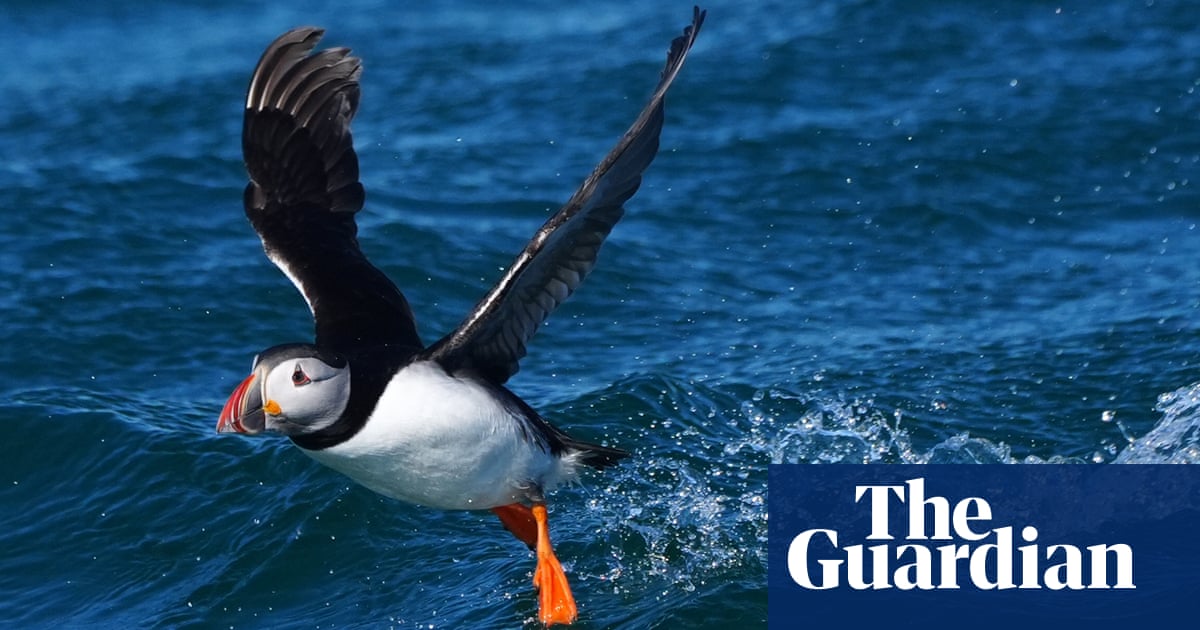Reaching the vantage point is a tricky business.
First, there’s a hop across a fence into Scratch Arse quarry – the stone workers used to find it such a cramped space to work in that their backsides would bump into the rock face. Then, a tiptoe through the slopes of early spider orchids and wild cabbage before a dizzying scramble down to the edge of the cliff.
Teams of hardy volunteers will be making the trip this spring, come rain or shine, to try to solve the mystery of the Purbeck puffins.
This stretch of Dorset coast is the last known regular nesting site forpuffinson the mainland of southern England. In the 1950s, there were about 80 birds nesting on this coast but the number of pairs has dropped to three and there have been no definitive sightings of fledglings for years. If the trend is not reversed, the colony will probably vanish within 15 years.
“It is very worrying,” said the marine ornithologist Richard Caldow, who has been monitoring the birds since 2023. “In recent years, only three nesting pairs of puffins have been seen, along with a few adolescent birds. Without intervention, they are probably facing extinction here.”
The problem is that no one is quite sure what intervention is needed because it is unclear what is ailing the puffins. “The mystery is why they declined but didn’t go extinct completely. I’ve spent many hours sat here trying to puzzle it out,” said Caldow.
The craggy characteristics of the spot makes the puffins hard to observe. The entrance to only one nest site is visible from the vantage point, and the crucial spot is deep in a crevice. The other two are tucked around the cliff corner. When they leave the nest, fledglings tend to vanish at night so to work out if there are any there you have to look out for fish deliveries.
The puffins carried fish to their nests for three weeks in 2023 but stopped abruptly, suggesting that the fledglings died suddenly. The birds began building nests in 2024, but were not seen delivering any fish, probably because their eggs failed to hatch.
Caldow said watching out for the Purbeck puffins bringing in fish required patience. “They are good at appearing out of nowhere and disappearing again,” he said.
The technique is to spot them as they approach with the naked eye then peer through binoculars as they near the cliff. “It’s easy to be distracted by a dolphin fin or peregrine falcon passing by,” he said.
Together with theNational Trustand theDorset Wildlife Trust, Caldow oversaw the placing of motion-sensor cameras in a narrow fissure where the puffins nest.
Volunteers combed through more than 70,000 images in search of clues to the crisis, perhaps raids by rats or crows. But no predator was spotted and there were no other leads.
There are plans to reinstate the cameras next year with better equipment. What the volunteers from thePurbeck Natural History Forumobserve this spring will inform the move. Boat operators have also been asked to join in by keeping an eye on nesting areas from the sea.
Sign up toDown to Earth
The planet's most important stories. Get all the week's environment news - the good, the bad and the essential
after newsletter promotion
The first puffin sighting at Purbeck this year was on 20 March, slightly later than the past two years. When the Guardian visited, one was bobbing 200 metres (200 yards) out to sea.
Caldow went through the possible reasons for the decline. The peregrine falcons and herring gulls are not top of his list of suspects. “They have better, easier food sources elsewhere,” he said.
Humans – boaters, climbers and coasteering groups – are also thought to be in the clear. Most know to avoid the cliff and it used to be an industrial landscape when it was quarried. The puffins were not put off by humans digging and blasting, so they would probably not be disturbed by a few people now.
The climate emergency could be a factor. Perhaps the puffins are struggling to find enough food – but the razorbills that also nest at the site seem to be thriving.
Though they were not caught on camera, Caldow’s prime suspects are carrion crows, jackdaws, rats and mice, which could squeeze into the crevices.
As he sits on the cliff, he dreams up possible solutions – perhaps sealing back and side entrances to the nesting site with concrete? But that wouldn’t go down well on a stretch of world heritage coast. Constructing an artificial cliff face that predators couldn’t access? Very expensive.
It is probable that some of the same puffins return to the Purbeck coast year in and year out. They can live for up to 30 years and one of the regulars has a distinctive greyish back. But when they leave, they travel far afield and a fear is that if one or two got caught in a nasty winter storm, they might not make it back.
“It wouldn’t take too much to push them over the edge,” said Caldow. “This may be the last chance saloon for them.”
